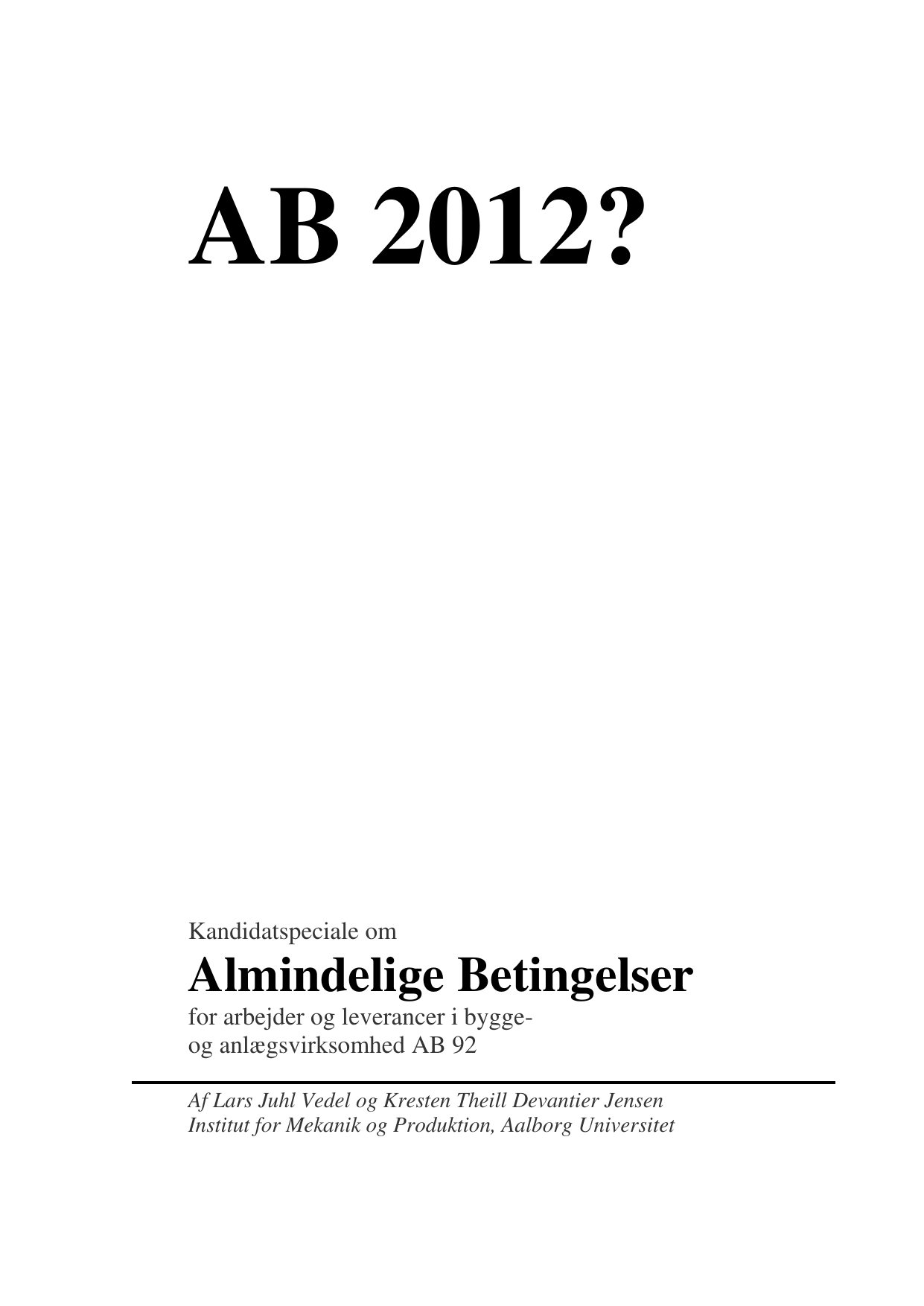
AB 2012?: Almindelige Betingelser for arbejder og leverancer i bygge- og anlægsvirksomhed AB 92
Oversat titel
AB 2012?: General Conditions for the provision of works and supplies within building and engineering AB 92
Forfattere
Semester
4. semester
Uddannelse
Udgivelsesår
2012
Afleveret
2012-01-10
Abstract
The master’s thesis is based on the Danish General Conditions for the provision of works and supplies within building and engineering (abbreviated AB 92 in Danish). The general conditions are designed as an agreed document and its purpose is to control the relationship between the different parties in the construction work. Accordingly, AB 92 defines principles and is a joint basis for agreements and conditions between client and contractors. The general conditions have been adjusted traditionally just about every 20 years and hence the question is whether the development in the industry points to a need for reevaluation after another 20 years have gone by. To answer this question, the problems by making use of AB 92 for the different parties involved have been analyzed. In the analysis, qualitative interviews of contractors, clients, client advisers, lawyers and industry associations have been made. The analysis shows that the respondents believe that 20 years is a long time without revision, however, one shall not revise just for the sake of revision. Also, the fact that the general conditions last for a long time has a certain value to it. AB 92 thus works well; still, the respondents each mentions several areas that could be adjusted or changed in an audit. Therefore, one may conclude that AB 92 contains several problems that may point to a revision. The problems about AB 92 have been discussed with Professor Dr. Jur. Ole Hansen from Faculty of Law, University of Copenhagen. Ole Hansen does research in this exact topic and, according to him, the problem with the new cooperation practices in relation to AB 92 is relevant for further investigation. Therefore, the thesis is delineated to deal with this problem. In the second part of the thesis, another investigation has been made, which is based on the clarified problems and thus aims to interpret and explain what the problem of making use of AB 92 in new cooperation practices is. The conclusion of the thesis shows that the use of AB 92 in new cooperative practices is a problem, since the general conditions did not keep up with the development of the industry. Ever since the last revision of AB, there has been a major development in the construction industry. Especially new technology has meant that construction has become more complicated. This has led to the fact that the different parties of the construction collaborate in new ways. Complexity has led to a need to involve the contractor earlier in the process, which means that the traditional roles in AB 92 are changed. In order to meet this need, the parties of the industry have developed new cooperation practices, which may be categorized as a sort of in-between-tendering-form. By examination of the in-between-tendering-forms which are used in the Danish construction industry today, one may conclude that there has been a move away from the traditionally design-bid-build contracts towards design-build contracts. The contracts, as they are concluded today, may be considered as individual modified intermediate forms, in which the risks and responsibilities are shared by the different parties. Therefore, the sharp separation between plan and execution, as the traditional AB 92 provides for, no longer exists. Based on the possible analysis that has been carried out through this project, the conclusion seems to be that there is no need to revise AB 92 concerning simple contracts. In this case, simple means that there, by the time of the agreement, is a greater degree of certainty about the content of the contract and about under which conditions the service is to be presented. However, in projects where technological complexity requires a higher level of cooperation, this is not the case. In these projects, new cooperation practices, where the tender may be described as an intermediate form between design-build and design-bid-build contracts, we see a need for a new contract basis. Whether the solution to the problem is to incorporate the new tender form in AB 92 or to develop a new contractual basis is not important. Nonetheless, if no one addresses the problems concerning the new cooperation practices, the industry continually will lack regulations that may take the new risks and responsibilities into account.
